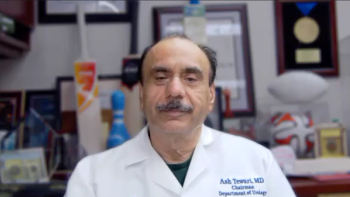
Gemcitabine-Containing Combo Increased Complete Response in Germ Cell Tumors
The addition of gemcitabine to a cisplatin- and ifosfamide-containing drug regimen resulted in a complete response rate of greater than 50% in patients with relapsed metastatic germ cell tumors, results of a phase II study indicated.
The addition of gemcitabine to a cisplatin- and ifosfamide-containing drug regimen resulted in a complete response rate of greater than 50% in patients with relapsed metastatic germ cell tumors, results of a phase II study indicated.
In addition, this drug regimen resulted in a high 2-year survival rate with no severe neurotoxicity, leading researchers led by Karim Fizazi, MD, PhD, of Institut Gustave Roussy, France, to conclude that this regimen combined with granulocyte colony-stimulating factor “may prove to be an appealing option for patients relapsing after first-line chemotherapy and requiring standard-dose chemotherapy.”
According to background information in the article
“In the early 2000s when the present study was designed, data available from the Memorial Sloan-Kettering Hospital group suggested that patients with a testis primary cancer, previous chemotherapy limited to one line, and those who had achieved a previous complete response were predicted to experience a better outcome,” the researchers wrote. “Taking these data into account a decade ago, the French Study Group of Genito-Urinary Tumors (GETUG) recommended that patients with relapsing disseminated germ cell tumors after chemotherapy for non-stage I disease and an anticipated favorable outcome be treated with standard-dose chemotherapy, while others would be considered for high-dose chemotherapy.”
Therefore, this study included 37 patients aged 16 years or older with relapsed germ cell tumors. Patients were assigned treatment of 4 cycles of gemcitabine 1,000 mg/m2 on day 1 and day 5, ifosfamide 1,200 mg/m2 per day (1-5), and cisplatin 20 mg/m2 per day (1-5). Granulocyte colony-stimulating factor was given from day 7 to day 14 of each cycles.
Overall 78% of patients had a favorable response to the treatment regimen. Twenty of the 37 patients, or 54%, achieved a complete response, including 12 patients with clinical complete response, 4 with a pathologic complete response, and 4 with a surgical complete response. An additional 10 patients achieved partial response.
At a median follow-up of 53 months, 18 patients had disease progression or had died. The 2-year overall survival rate was 73%, and the continuous progression-free survival rate was 51%.
No patients in the study developed grade 3/4 neurotoxicity. Fifty percent of patients received platelet transfusion and 72% received red cell transfusions.
Newsletter
Stay up to date on recent advances in the multidisciplinary approach to cancer.






































